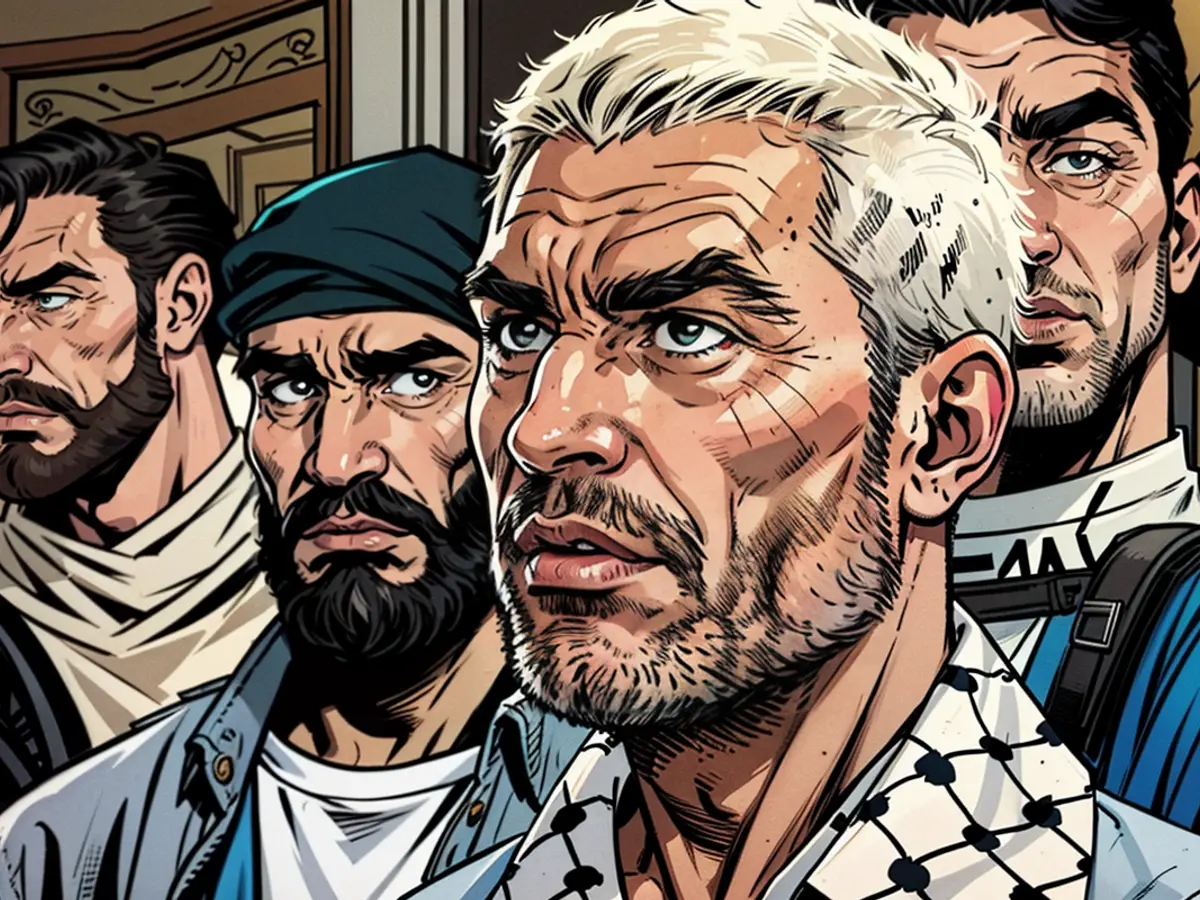Israel claims responsibility for eliminating the Hamas figurehead responsible for the October 7 incident. Here's what has been disclosed.
The demise of Hamas leader Yahya Sinwar could potentially present a unique chance to negotiate a truce, as asserted by American authorities – having previously taken out key Hamas commanders such as Ismail Haniyeh, the organization's former political head, as well as leaders from the militant group Hezbollah in Lebanon.
Hamas and Hezbollah are two components of an alliance of militant factions backed by Iran.
In a video message recorded on Thursday, Israeli Prime Minister Benjamin Netanyahu stated that Sinwar's death signified the " dawn of the day after Hamas," but stressed that the task at hand was far from over.
Hamas has yet to release a statement regarding the reports of their leader's demise.
Here's what you ought to know.
How did it transpire?
Since the October 7 incidents, Israel has intensified its search for Sinwar, proclaiming him as the most-wanted individual in Gaza and a "ghost walking among us." At one point, an Israeli military spokesperson declared that their pursuit would continue until Sinwar was captured, dead or alive.
According to US officials, the Israeli military came close to capturing Sinwar on several occasions – once even managing to obtain a video that allegedly showed Sinwar with his family inside a Gaza tunnel, but he managed to evade capture. The Israeli military had previously encircled Sinwar's residence and conducted an extensive assault on his hometown of Khan Younis, but could not locate him.
The year-long pursuit finally concluded unexpectedly on Thursday in Rafah, southern Gaza. Israeli troops were in the area for a routine military operation when they came under fire near a building, as per two Israeli sources.
The troops returned fire with a tank, followed by deploying a drone into the heavily damaged building, according to the Israeli military. The footage, shared by the military, depicted Sinwar's apparent final moments – sitting alone in a chair, surrounded by dust and debris, appearing to gaze directly at the camera. He held a piece of wood in his hand and hurled it at the drone before the video concluded.
It was only then, and when the troops examined the wreckage, that they discovered Sinwar among the deceased, according to the Israeli military.
Dental records and various biometrics helped Israel identify Hamas' leader, according to a US official and former official familiar with the situation.
Sinwar had been attempting to flee towards the north at the time of his death, claimed another Israeli military spokesperson. He was found with a firearm and over $10,000 in Israeli shekels, the spokesperson added.
Who was Sinwar?
Sinwar had been a significant figure in Hamas since the late 1980s, quickly ascending the ranks of the militant group after joining.
Born in a refugee camp in Gaza following his family's displacement from the Palestinian village of Al-Majdal – now a part of Ashkelon – during the Arab-Israeli war as refugees, Sinwar became an anti-occupation activist as a student and was imprisoned in Israel on several life sentences after being accused of orchestrating murders. He served 23 years before being released as part of a prisoner swap in 2011.
Upon returning to Gaza, Sinwar swiftly gained prominence. He established the Hamas' feared international intelligence and security branch, Majd, and was known for employing violent tactics against those suspected of collaborating with Israel.
In 2017, Hamas elected Sinwar as the political chief of the Politburo, their main decision-making body in Gaza.
Sinwar was designated a global terrorist by the US Department of State and the European Union in 2015 and was sanctioned by the United Kingdom and France in recent years.
However, he gained more notoriety after the October 7 incidents as one of Israel's primary targets. Israeli officials referred to him as the "epitome of evil" and "the butcher from Khan Younis."
He emerged as one of Hamas' most senior leaders in August following Ismail Haniyeh's assassination in Iran. Sinwar had gone into hiding since the October 7 incidents, likely surviving Israel's siege of Gaza by taking refuge in a vast network of underground tunnels.
What was his role on October 7?
Israel has publicly blamed Sinwar for masterminding Hamas' October 7 attack – although experts suggest he was likely one of several.
The attack resulted in the deadliest assault on Israel in its history. Hamas and other Palestinian armed groups killed over 1,200 people, primarily civilians, and took approximately 250 individuals as hostages.
Sinwar was identified as a critical decision-maker and likely served as the international community's primary point of contact in Gaza during the intense negotiations over the hostages' release.
These negotiations involved senior figures from Israel, Hamas, the United States, Qatar, and Egypt.
What's next?
While it's too early to predict what may happen next or how Hamas may respond, Sinwar's demise represents another blow to the organization – which has endured the loss of several top leaders during Israel's campaign to dismantle Hamas entirely.
Just a day after Haniyeh's assassination, Israel confirmed it had killed Hamas' military chief Mohammed Deif during a previous strike – another reported mastermind behind October 7.
With a ceasefire and hostage release deal proving elusive for months, senior US officials had pinned their hopes on Sinwar being captured – potentially paving the way for a resolution. With him now missing, officials speculate this could present one of the best opportunities to bring the Israel-Hamas conflict to an end, but are hesitant to make any definitive statements about the ultimate implications for the volatile region.
Biden chatted with Netanyahu on a call Thursday, and they both concluded that there's potential to push for the hostages' release and stated they'd collaborate to accomplish this aim, as disclosed by Netanyahu's office in a summary.
However, information about Sinwar's sibling's whereabouts remains unclear.
Mohammed Sinwar assumed control as Hamas's military chief recently, a senior Israeli official mentioned to CNN last month. The brothers were extremely close, and up until late August, they were frequently together, the same Israeli official revealed to CNN.
In case Mohammed managed to survive this week, he might carry on his brother's demanding bargaining methods as Israel aims to retrieve its remaining hostages from the Palestinian territory. However, until we obtain a clearer understanding, it will be tough to predict the militant group's actions ahead.
Even if Mohammed passes away, the broader Middle Eastern dispute doesn't cease – especially as Israel readies to retaliate against Iran's missile attack earlier this month. CNN had previously reported that Israel planned to carry out this counteraction prior to the US election.
Additionally, a new and more intense phase in the conflict is intensifying along the Israel-Lebanon border, with Hezbollah announcing a "new and escalating phase" in their confrontation with Israel on Thursday.
Hezbollah has suffered severe losses recently – from the lethal attacks on pagers and walkie-talkies that took countless lives and injured countless others, many of whom were civilians, to the assassinations of several high-ranking commanders, including their leader Hassan Nasrallah last month.
Meanwhile, in Gaza, Palestinians told CNN that they don't believe Sinwar's death will bring an end to the war – although some voiced some hesitant optimism.
"Sinwar is gone, but countless of our people have been killed, and there's no justification for Netanyahu to carry on the war," stated 22-year-old Mumen Khalili.
CNN's Kara Fox, Ivana Kottasová, Jeremy Diamond, Dana Karni, Pauline Lockwood, Sophie Tanno, Kevin Liptak, MJ Lee, Kylie Atwood, and Alex Marquardt contributed to the reporting.
The Middle East, being a region of geopolitical importance, is closely watching the developments in Gaza, especially the potential impact of Yahya Sinwar's demise on Hamas and the broader world.
Given the strategic alliance between Hamas and Hezbollah, the impact of Sinwar's death could have ripple effects in Lebanon and other regions influenced by Iran's influence.








